Peptides for Hair Growth
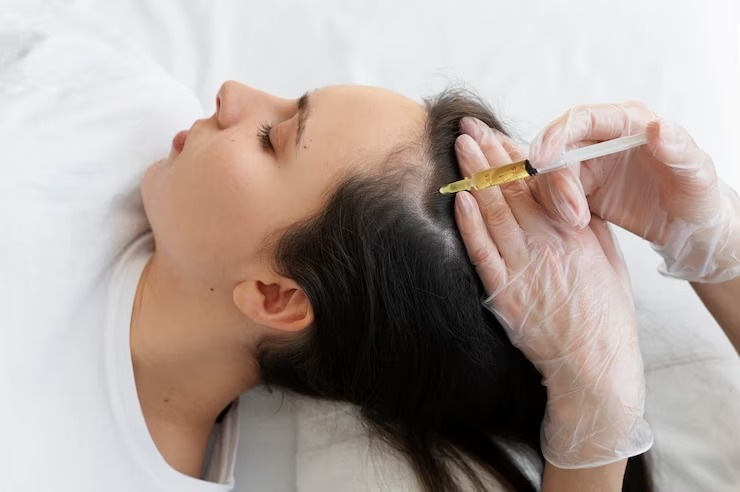
People constantly seek innovative solutions in hair products for beautiful and healthy hair. One such breakthrough in hair care is the use of peptides. Peptides are tiny chains of amino acids that play crucial roles in various biological processes, including hair growth. Incorporating peptides into your existing hair-care routine can unlock the secrets to vibrant and luscious locks.
Understanding Hair Growth and Hair Loss
Before delving into the specifics of peptides for hair growth, it’s essential to grasp the basics of hair’s growth cycle and the pattern of hair loss. Hair growth occurs in cycles, consisting of a growth phase (anagen), a transitional phase (catagen), and a resting phase (telogen). On average, each hair strand goes through these cycles over several years, with around 90% of the hair on our scalp in the growth or transition to anagen phase, at any given time.
In addition, peptides improve blood circulation to the scalp, ensuring that essential amino acids and nutrients, vital for hair health, reach the hair follicles. This enhanced nourishment supports healthier and stronger hair growth. Moreover, peptides possess antioxidant properties, which protect the hair follicles from oxidative stress, thereby preventing damage and premature hair loss.
The Role of Peptides in Promoting Hair Growth
Peptides influence and enlarge hair follicle size and growth through several mechanisms. Firstly, they stimulate dermal papilla cell proliferation, which regulates hair follicle development and growth. By promoting the activity of these cells, peptides can enhance the hair cell size and increase hair density therein.
Additionally, peptides improve the circulation of blood to the scalp, ensuring that essential nutrients and oxygen reach the hair growth. This increased nourishment promotes healthier and stronger hair growth. Furthermore, peptides possess antioxidant properties, protecting hair follicles from oxidative stress and preventing damage and premature hair loss.
Collagen Peptides for Hair: Restoring Strength and Vitality
Collagen, a protein abundantly found in our bodies, provides structure and strength to various tissues, including the hair. Derived from collagen protein, collagen peptides offer unique benefits for hair care by improving the elasticity and resilience of hair strands, thus reducing breakage and split ends. By incorporating collagen peptides into your hair care routine, you can restore strength and vitality to your locks.
The Ordinary Multi-Peptide Serum for Hair Density: Enhancing Thickness and Volume
Multi-peptide serums are gaining popularity in hair care to combat thinning hair and promote density. These serums contain a blend of peptides that work synergistically to enhance hair thickness and volume. By stimulating dormant hair follicles, these peptides encourage the growth of new hair strands, resulting in fuller and more voluminous hair.
Best Peptide for Hair Growth
Several peptides have been studied for their potential effects on hair growth and in causing hair loss. Here are some of the commonly mentioned peptides and their associations with hair condition:
-
GHK-Cu (Copper Peptide) for Hair:
GHK-Cu is a peptide complex consisting of the three amino acids, glycine, histidine, and lysine, combined with copper. It has been researched for potential benefits in hair growth and loss prevention. GHK-Cu is believed to promote hair follicle development and stimulate the production of factors necessary for hair growth.
-
BPC-157 for Hair:
Although BPC-157 is primarily known for its regenerative effects on various tissues, some studies suggest it may also positively affect hair growth and stimulate blood flow and wound healing. BPC-157 is believed to enhance blood circulation and promote wound healing, potentially benefiting hair follicles to increase blood circulation and growing more hair.
-
CJC-1295 and Ipamorelin for Hair:
CJC-1295 and Ipamorelin are both growth hormone-releasing peptides (GHRPs) that stimulate the release of growth hormones in the human body. While there is limited direct research on their effects on hair growth, growth hormone is known to play a role in hair care. Increased growth hormone levels promote hair growth and improve hair quality.
-
Thymosin Beta 4 for Hair:
Thymosin Beta 4 is a naturally occurring tissue repair and regeneration peptide. Some studies suggest that it may have potential benefits for hair growth and hair loss treatment. Thymosin Beta 4 promotes blood vessel formation growing hair, and stimulates hair follicle stem cells, improving hair growth.
Benefits of Peptides for Hair
If you’re looking for a solution to boost hair growth and improve the health of your hair, peptides may be the answer you’ve been searching for. Peptides are small chains of amino acids that play a crucial role in various biological processes, including hair growth and maintenance. In this article, we will explore five essential benefits of peptides for support healthy hair growth.
1. Stimulates Hair Growth
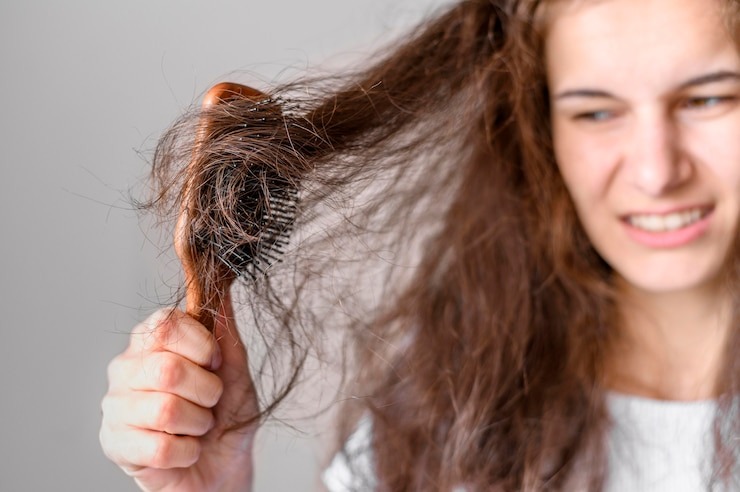
One of the primary benefits of peptides for hair is their ability to stimulate growth. Specific peptides increase the flow of blood to the scalp, delivering vital nutrients and oxygen to the hair follicles. This enhanced blood flow promotes the growth of thicker, stronger hair strands. Additionally, peptides can extend the hair follicles’ anagen (growth) phase, leading to longer and more abundant hair growth.
2. Strengthens Hair Follicles
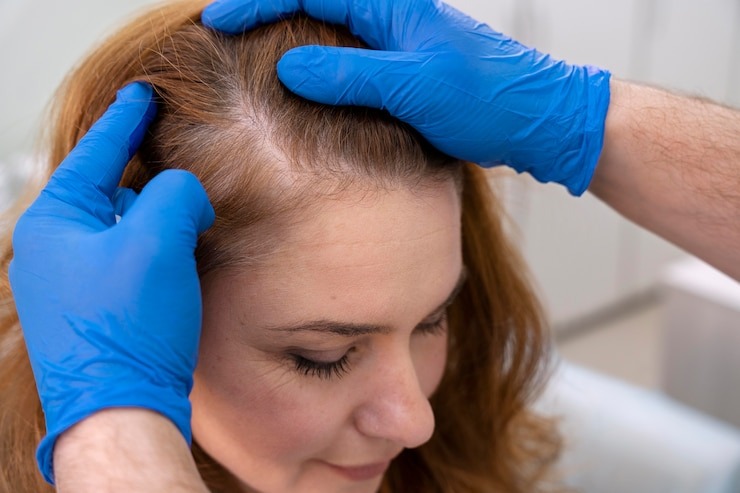
Healthy hair starts at the root, and peptides can strengthen the hair follicles from within. Peptides boost collagen production, providing structural support to the hair follicles. Stronger hair follicles are less prone to breakage and can better withstand external damage, such as heat styling or chemical treatments. By strengthening the hair follicles, peptides contribute to overall hair health and reduce hair loss.
3. Improves Hair Thickness and Density
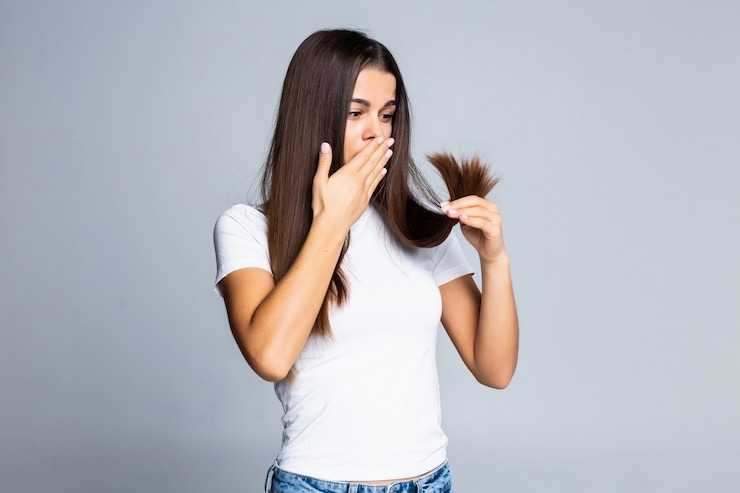
If you have hair thinning or sparse hair, peptides can help improve its thickness and density. Peptides promote the production of keratin, the protein that makes up most of our hair strands. By supplying the necessary amino acids for keratin synthesis, peptides help thicken the individual hair fibers, resulting in fuller and more voluminous hair. Increased keratin production and hair density can also give the appearance of a healthier and more luxurious mane.
4. Nourishes the Scalp
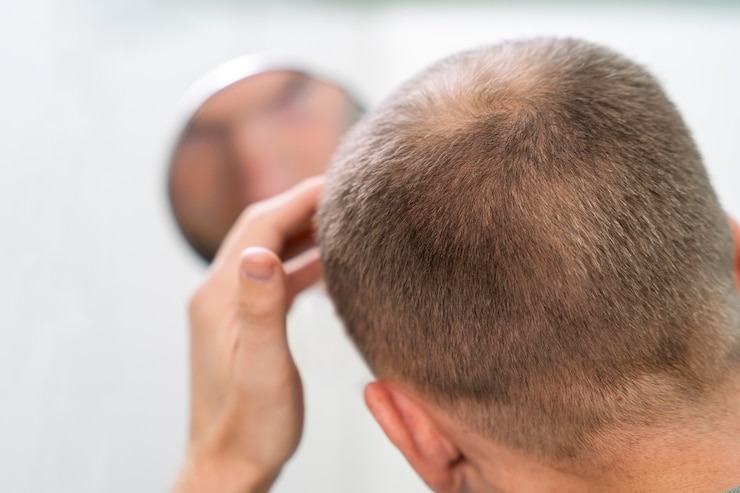
A healthy scalp is essential for optimal hair growth, and peptides can contribute to scalp health. Peptides have moisturizing and nourishing properties that help hydrate and soothe the dry scalp itself. They can also reduce inflammation and balance the scalp’s pH levels, creating an environment conducive to healthy hair growth. By nourishing the scalp, peptides promote a healthier foundation for your hair to grow and thrive.
5. Reduces Hair Loss
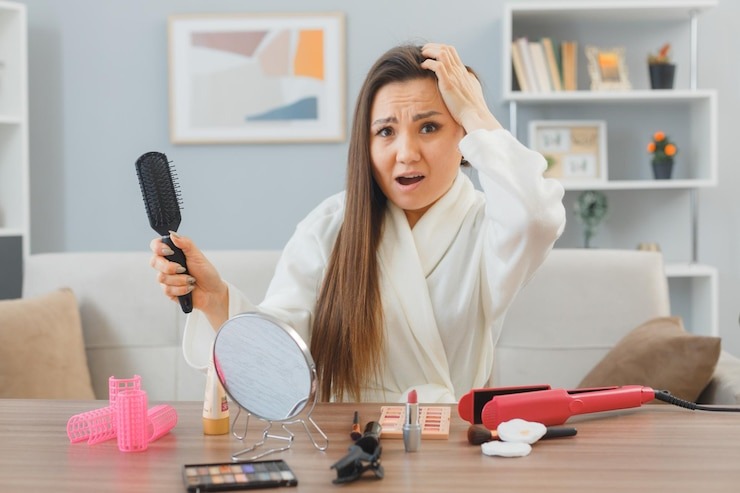
Hair and female hair loss, can be distressing, but peptides offer a potential solution. Specific peptides inhibit the production of dihydrotestosterone (DHT), a hormone that contributes to hair loss and thinning. By blocking DHT, peptides help prevent the miniaturization of hair follicles and reduce the rate of hair shedding. Incorporating peptides into your hair care routine can help maintain the density and fullness of your hair, minimizing the effects of hair loss.
Side Effects of Hair Peptide
Peptide hair serums have some potential side effects.
Scalp Irritation:
Some individuals may experience mild irritation, itching, or redness at the application site. This can occur if you have sensitive skin or are allergic to any of the ingredients in the serum.
Allergic reactions:
An allergic reaction may occur in rare cases, resulting in more severe symptoms such as swelling, hives, or difficulty breathing. If you experience these symptoms after using a peptide hair serum, discontinue use immediately and seek medical attention.
Dryness or increased oiliness:
Peptide serums may affect the moisture balance of your scalp, causing it to become either excessively dry or oily. If you notice any changes in your already dry scalp’s condition, adjust the frequency of use or discontinue the product.
Breakouts or acne:
Some individuals may be more prone to developing breakouts or acne on the skin spots the scalp or forehead due to the ingredients in the serum. If you notice increased pimples or blemishes, it’s best to stop using the product.
Hair texture changes:
While the primary intention of peptide serums is to improve the health and appearance of the hair, some individuals may notice changes in hair texture, such as increased dryness or brittleness. If this occurs, reducing the frequency of application or discontinuing use may help restore your hair’s natural texture.
Excessive Hair Growth:
Hair peptides are often used to stimulate hair growth. However, in rare cases, some individuals may experience excessive hair growth in unintended areas, such as the face or body. This side effect is more commonly associated with certain medications used for hair growth.
FAQs (Frequently Asked Questions)
Q1. Can peptides help with hair growth?
Yes, peptides can help promote and strengthen hair follicles’ growth by stimulating dermal papilla cells, improving the flow of blood, reducing inflammation, and protecting hair follicles from damage.
Q2. How long does it take to see results from peptides for hair growth?
Results can vary from person to person, but it may take several weeks or months of consistent use to notice significant improvements in hair growth.
Q3. Does copper peptide regrow hair?
Copper peptides have shown potential in promoting hair growth by stimulating dermal papilla cells and improving scalp the flow of blood. While results may vary, copper peptides can be beneficial in supporting hair regrowth. Consulting with a healthcare professional or dermatologist is advisable for personalized guidance on topical treatment.
Q4. Is collagen peptides good for hair growth?
Collagen peptides play a crucial role in maintaining the strength and elasticity of hair. While direct scientific evidence linking collagen peptides to hair growth is limited, collagen is essential for healthy hair. Including collagen peptides in your diet or as a supplement may support hair and improve scalp health. For personalized advice, it’s recommended to consult with a healthcare professional.
